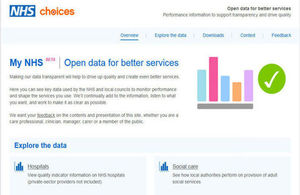Formal launch of MyNHS
New website will provide data on NHS performance and allow patients to compare care.

Health Secretary Jeremy Hunt has today (19 November 2014) formally launched MyNHS. This is a new site on NHS Choices where people can compare the performance of their local NHS hospital, their care services and their local authority with up-to-date information.
The launch comes 1 year after the government’s response to the Francis Inquiry on Mid Staffordshire. It is the first time such a wide range of performance indicators has been made available to the public in this way.
MyNHS includes simple, searchable data on:
- food quality
- staffing
- patient safety
- mental health
along with many other areas of care.
Data has been added to MyNHS since September. Starting today, people will also be able to search consultant outcome data on NHS Choices. This completes the first phase of the site.
The data will allow the NHS and patients to better see and measure progress in health outcomes and will become an increasingly powerful resource for patients, doctors and local NHS commissioners of these services.
From early December, patients will also be able to see the Care Quality Commission’s individual risk rating for GP practices. Over time, more data will be added, including 1-year and 5-year cancer survival rates for NHS trusts.
In a speech at the Foundation Trust Network Conference, the Health Secretary also announced that the government will consult on including explicit rights in the NHS Constitution for patients and the public to have clear and comparable data about the organisations providing their care.
Health Secretary, Jeremy Hunt said:
Targets matter - and the key A&E and 18 week targets have driven huge improvement over the last 15 years. But perhaps because of that success, we have allowed a conventional wisdom to develop that the best way to change anything is through yet another target and a bit more money.
Ten years ago, Sir Bruce Keogh and heart surgery colleagues showed the world that there is a different way. They achieved dramatic improvements in performance, not through new targets, but by publishing results for individual cardiac surgeons for the first time. Transparency is about patient outcomes not process targets. It uses the power of a learning culture and of peer review, not blame.
Healthcare globally has been slow to develop the kind of safety culture based on openness and transparency that has become normal in the airline, oil and nuclear industries. The NHS is now blazing a trail across the world as the first major health economy to adopt this kind of culture.
Past President of the Royal College of Surgeons, Professor Norman Williams said:
The NHS is world leading in publishing surgical outcomes – it is one of the first to embark on this and covers the highest number of specialities. More generally, the NHS has shown leadership and ambition in its approach to transparency by publishing such a wide range of information on quality and performance. This kind of breadth of information will help to continually drive up standards.